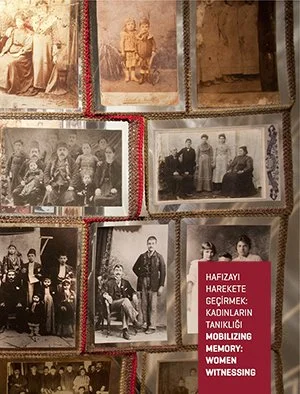"Mobilizing Memory: Women Witnessing" EXHIBITION CATALOGUE
Opening Reception: September 5, Friday, 18:30
Venue: DEPO Istanbul (Lüleci Hendek Cad. 12, Tophane - Istanbul)
Artists: Gülçin Aksoy, Hera Büyüktaşçıyan, Silvina Der-Meguerditchian, Hakikat Adalet Hafıza Merkezi (Truth Justice Memory Center), Gülsün Karamustafa, Susan Meiselas, Nar Photos (Serra Akcan, Fatma Çelik, Gülşin Ketenci, Aylin Kızıl, Serpil Polat), Lorie Novak, Emine Gözde Sevim, Aylin Tekiner
View exhibit catalog here (PDF)
Curated by: Ayşe Gül Altınay, Işın Önol
What is the role of witnessing in practices of resistance: resistance to enforced silence and forgetting, to state power, and to inaction? What role do the arts play in combatting the erasure of past violence from current memory and in creating new visions and new histories for future generations? In particular, what unique strategies have women devised to reveal and redress the violence directed at woman and at other disempowered social groups?
The feminist art work displayed in this exhibit imagines memory as part of a larger politics of resistance. It mobilizes memories of past and present violence precisely to create the conditions and the motivations for social change. Bringing together women artists many of whom are themselves direct witnesses to oppression and terror, the exhibit also reveals moments of resilience, resistance, and creative survival. The artists gathered here use memory in innovative ways. They foreground unofficial acts of witness and forms of commemoration--embodied practices, performances, photography, testimony, street actions—that provide alternative histories and different political imaginaries than do official archives, memorials, museums, and state commemorations. They make visible not only violent crimes and their gendered dimensions, but also the intimate texture of lives and communities that have survived or are fighting to survive immense destruction. In honoring those lives and bringing them out of oblivion, the artists also reclaim women’s practices—dance, song, embroidery, for example—and show their political resonances. As a group, these artists resist monumentality in favor of intimacy, featuring individual stories of the quotidian. They use official archives to document and contextualize those lives, but they also create new archives and alternative interpretations, reframing how we understand the past and pointing to what has been excluded from authoritative histories. They thus imagine alternative social and political trajectories and more open and progressive futures.
This exhibit occurs in the context of a five-day workshop on “Mobilizing Memory for Action” that brings together an international group of scholars, artists, and activists to analyze the activist work memory practices can enable. The art works comprising this exhibit and the broadly comparative panels and roundtables on September 17 invite us to ask how our acts of witness can motivate social change. What do images and accounts of past and present violence demand of spectators, listeners, and readers? How can we modulate proximity with distance, empathy with solidarity? Indeed feminist practices of witness have fostered solidarity that demands not only collaboration and commitment, but also a respect for what is historically specific to particular acts of violence and oppression. In bringing diverse events of state violence—the Holocaust, the dictatorships in Latin American, American slavery—to the Armenian genocide, the persecution of Kurdish and Palestinian communities, and the oppressive acts of authoritarian power featured in this exhibit, the “Women Mobilizing Memory” workshop invites participants both to see where connections lie and also to recognize what cannot be generalized or translated across linguistic, national, or religious borders. In resisting silence, forgetting and erasure, progressive acts of memory also resist easy understanding, appropriation and straightforward comparison.
The collaborations among the participants in the working group, and between the artists and their subjects, aim to create a space of solidarity and connection. We invite you to enter into this larger collaborative project of responding to the memories recorded here, and to join us in the work of shaping memories for more hopeful futures.
Co-hosted by Columbia Global Centers | Turkey, DEPO Istanbul and Sabancı University Gender and Women's Studies Forum, the exhibition and parallel activities have been supported by the the Center for the Study of Social Difference, Blinken European Institute, Sabancı University, Hemispheric Institute of Performance and Politics, the Truth Justice Memory Center and Friedrich-Ebert-Stiftung Turkey Office.
For more information about the project please visit: http://socialdifference.columbia.edu/projects/women-mobilizing-memory

